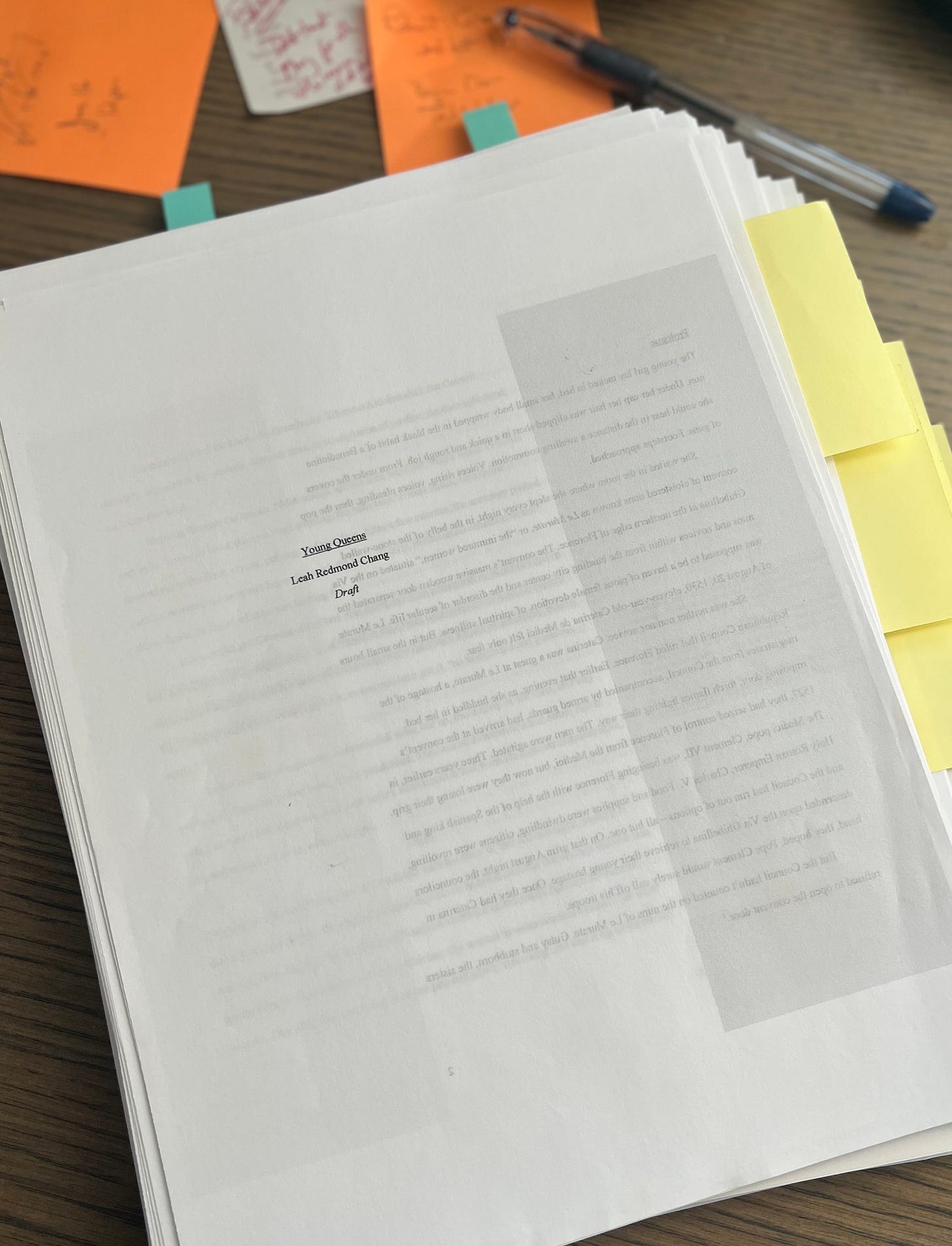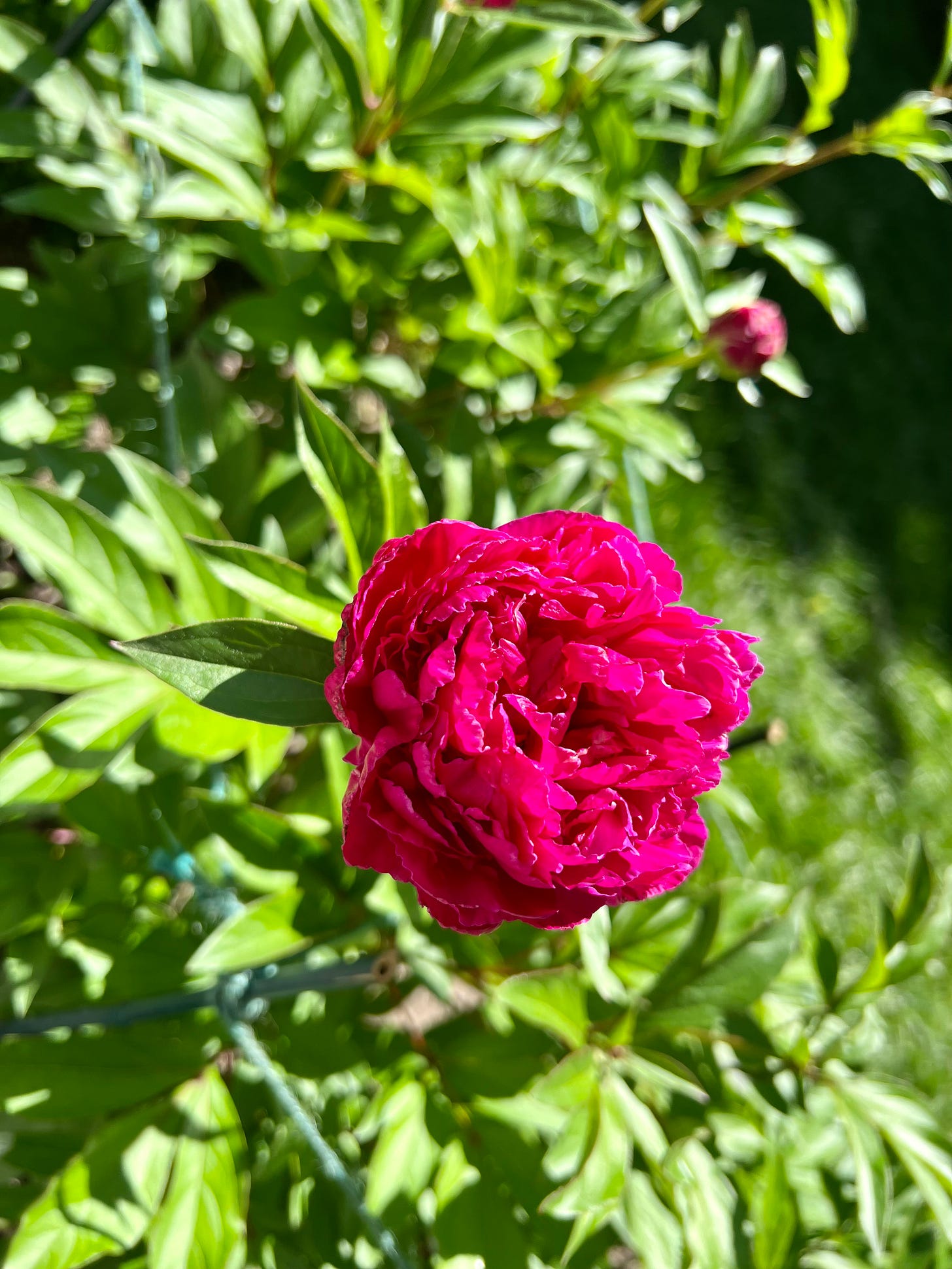A manuscript is a funny thing. It’s just a pile of pages, really, but somehow a manuscript creates this tangible tie between you and the people you’re writing about. Once, when I was having coffee with a friend and talking about my forthcoming book, Young Queens, I found myself repeatedly pointing to my workbag. A print-out of my book manuscript was in that bag, ready for a mark-up, but I kept gesturing to it as if the people themselves – the actual historical people – somehow lived in that bag. As if they were all sitting there, listening to what I was saying about them.
In Bird by Bird, Anne Lamott develops this wonderful image of herself grappling with the anxieties of writing: She describes herself sitting at her desk while all her personified neuroses quietly gather behind her, trying not to make a peep. I harbor my own share of anxieties about writing, but mostly I feel like the historical characters are sitting behind me waiting to see what I’ll next write. Mary Queen of Scots tapping her foot impatiently. I’ve got a touchy Philip II of Spain looking over my shoulder, judging.
I’ve been working on Young Queens for several years, and I’m happy to report that the draft is finally in the hands of my editors. The book traces the intertwined lives of several Renaissance-era queens, and it’s been both thrilling and daunting to comb through letters and various other texts to extract the lesser-known biographical details of these women. I’m excited, and frankly a little relieved, that my editors have started to work on the manuscript. There has been only one real casualty so far, if a big one: we’ve decided that Elizabeth I of England should be demoted to the second-tier cast. There were several reasons to do this, and it’s the right decision, if a sad one. I will miss her and I’m sure there will be other hard choices along the way.
Writing a book is challenging, frustrating, and seemingly never-ending, yet I can’t help but grow attached to my manuscripts. Because they take so long to write, they become a throughline over several years and through manifold life changes. This particular manuscript has seen me through a lot: a move back to the US from the UK, children growing up, a pandemic, a career shift. Leaving academia to focus on writing has had its ups and downs, to be sure. I’ve missed the bustle of the university, the energy of the classroom and the students, the water-cooler talk with colleagues. Nonetheless, moving to writing full-time has taught me plenty of lessons about work-life balance, about structuring writing and research days, about an entirely different industry of writing and publishing for a wider public as opposed to writing and publishing for specialists. It’s reminded me that family and friends make the best cheerleaders. And it’s been a joy to fashion a new voice, learn a new set of writing skills, and tackle different questions about history and women that I do not always get a chance to explore as a scholar.
I’d be lying, though, if I didn’t admit the challenges of going solo, of committing oneself to the writing knowing you no longer have the fallback of the classroom, the faculty position, the tenure. There are, inevitably, certain nagging questions: what if you can’t finish your book? What if it’s no good? What if no one reads it? What if you can’t figure out what to write next? And yet, without the fallbacks of the teaching and the tenure, you have no choice but to throw yourself entirely into the writing. As if your career depended on it because, in fact, it does.
And so, every day you show up at your desk, answering to a new boss – the ever-demanding manuscript. And yet, I’m grateful for it. What would life have been like these past two pandemic-years without that boss? I’ve been lucky during the pandemic: My family has stayed healthy, and the book-writing has given me focus, purpose, and consistency during two years of tumult. It’s been a gift, in a way.
I have several months to go on Young Queens. My editors and I still have work to do, but I am beginning to see the endpoint. And I’m already starting to sense the bittersweetness of watching the manuscript venture out into the world. I will miss this book. And it will take me some time to figure out how to live without it.
My garden is flush this year, and the peonies have already come and gone. Getting them to flower at all was another project years in the doing. Do you have any long-haul projects? I want to know what they are!







Interesting to learn of the writing process from an author. I have often wondered how one goes about conceiving of and then writing a book. Thank you
I was sitting in a café, wondering, once again, what I was doing here, alone, working on my projects, while others surrounding me were meeting and working together. This is when your newsletter arrived in my mailbox. I read it.
I do not feel as alone anymore. I actually feel that maybe I made the right decision by quitting academia and writing for the public. Thank you for presenting the challenges of being a writer as they are, so truthfully. You also write beautifully about the deep attachment that we develop with our characters. When I finished the first revision of my manuscript with my publisher, I knew that the next ones would be more about corrections related to language and grammar. I was not going to make my characters live and feel anymore. I am still mourning this.
Thank you Leah!